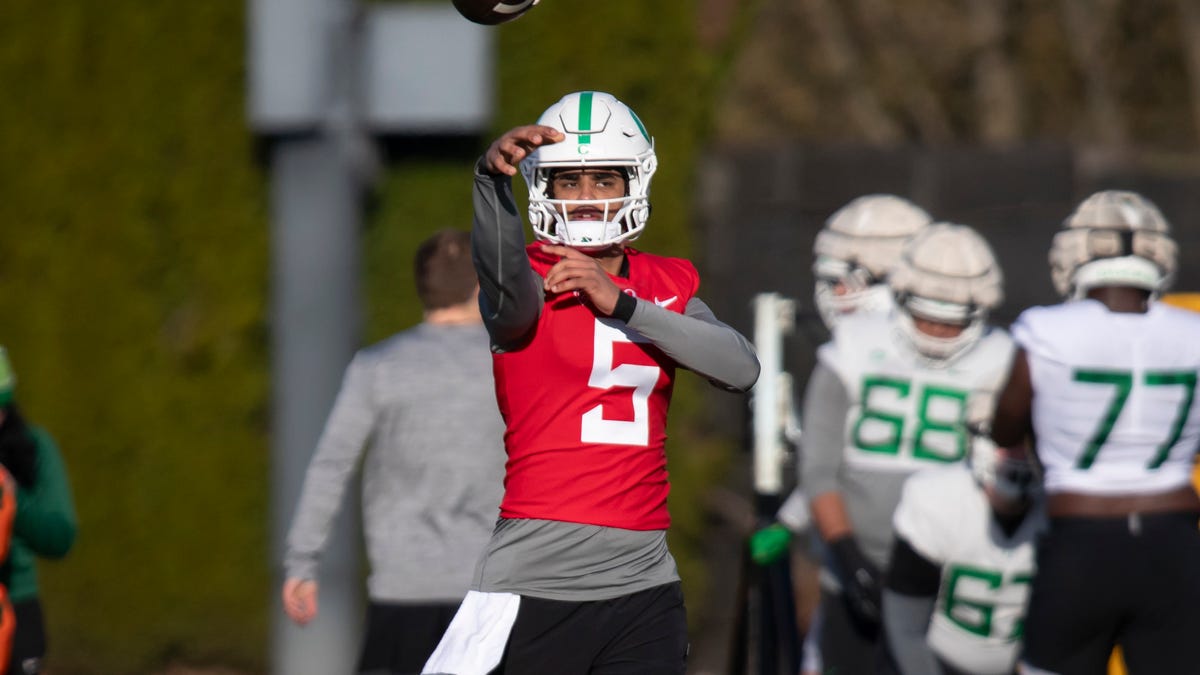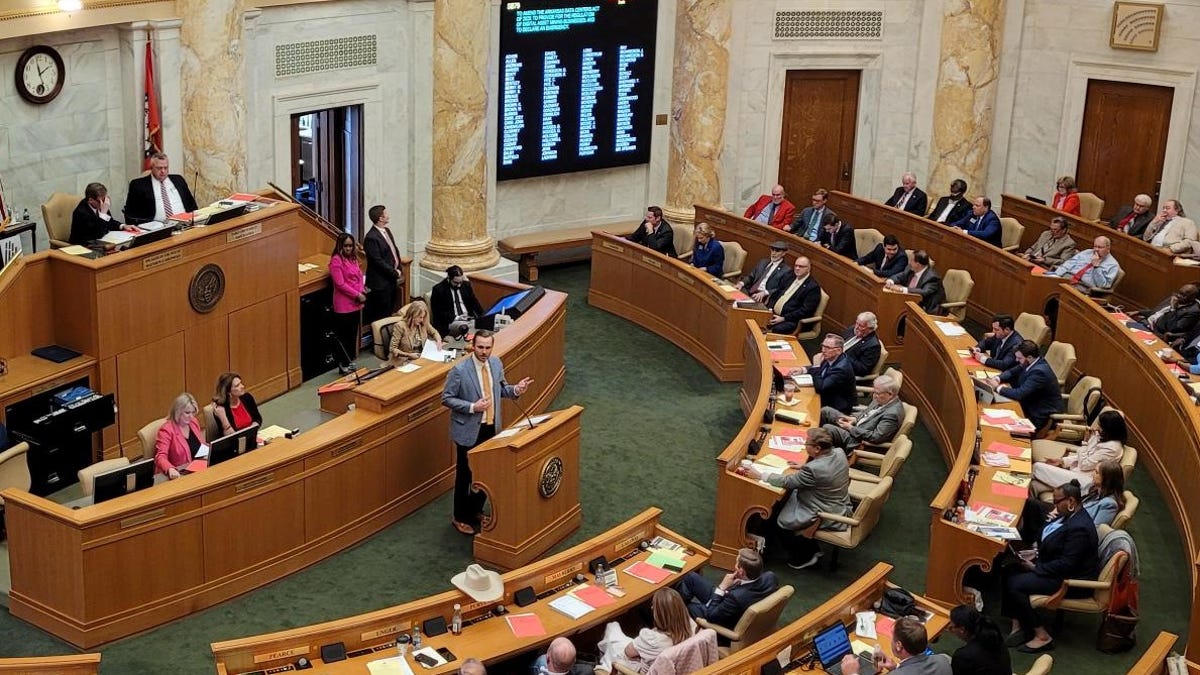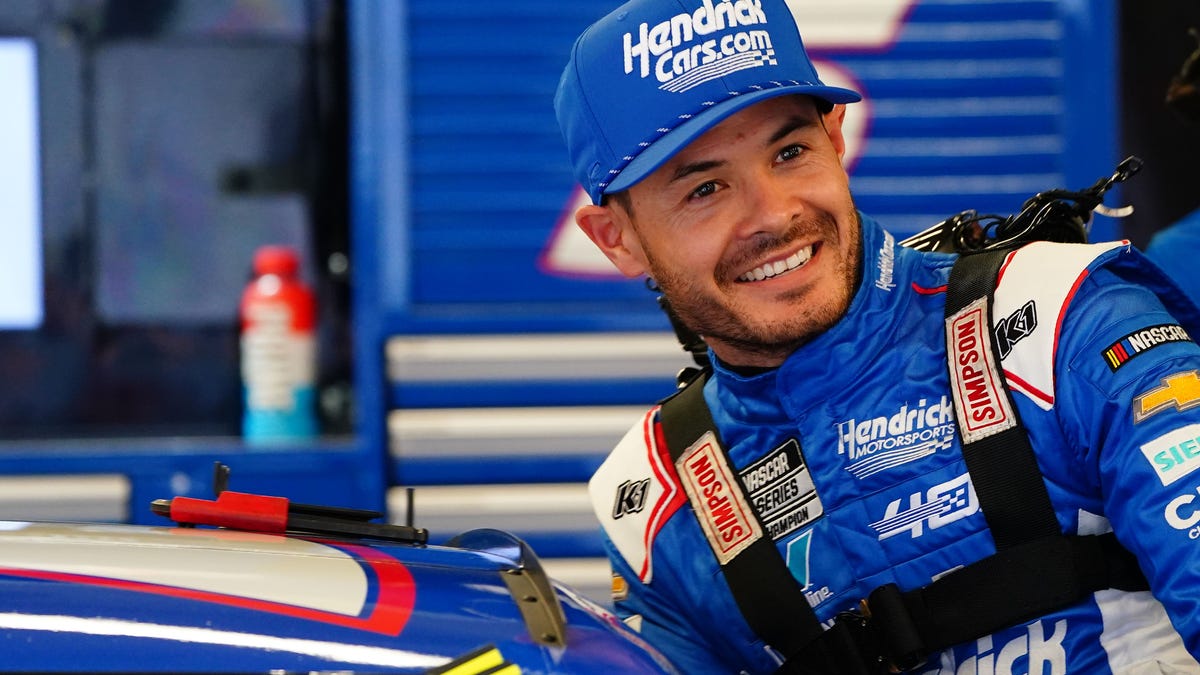Oregon
How former 5-star QB Dante Moore got back to Oregon football after one season at UCLA

Transfer QB Dante Moore on playing for Oregon football, Dan Lanning
Oregon football quarterback Dante Moore talks transferring to Oregon and learning from fellow transfer quarterback Dillon Gabriel.
Dante Moore put himself back on Oregon’s radar with a phone call to Dan Lanning in December.
But the two didn’t talk football, at least not at first.
The former UCLA quarterback, who was once committed to Lanning and the Ducks, reached out to the Oregon coach soon after entering the transfer portal when the 2023 regular season ended.
“I called him, really just checking up on life,” Moore said Thursday. “My mom, sadly, she had breast cancer and I was playing through that throughout the season. She got diagnosed with it during spring ball last year, so really, the first couple things he asked me was checking in on my mother.”
Moore’s mother has improved. His own prospects for personal growth seem to be trending in that same direction as well.
The road to Oregon hasn’t been the most straight forward for Moore, a former five-star recruit in the class of 2023 who was ranked as the nation’s No. 2 overall player by ESPN and No. 3 overall by 247Sports.
He was verbally committed to the Ducks throughout the fall of 2022 then flipped to the Bruins right before the start of the early signing period that December.
The Detroit native said his change of heart came after Oregon offensive coordinator Kenny Dillingham was named head coach at Arizona State in November 2022.
“As a quarterback, your OC needs to be your best friend,” said Moore, who added that he and Will Stein — Dillingham’s replacement at Oregon — did hastily attempt to build a relationship but ultimately he chose to sign with UCLA and play for coach Chip Kelly.
Dante Moore plays through mistakes at UCLA
Moore, who the Bruins listed as 6-foot-3, 210 pounds, played in nine games and made five starts for UCLA last season. He completed 114-of-213 passes (53.5%) for 1,610 yards, 11 touchdowns and nine interceptions.
He started his career by throwing for 615 yards, seven TDs and one interception in his first three games as the Bruins opened 3-0.
Then came a brutal stretch for the freshman. In consecutive games against then-No. 11 Utah, then-No. 13 Washington State and then-15 Oregon State, he threw for 689 yards, three TDs, six interceptions and was sacked 16 times.
He also had an interception returned for a touchdown in each of those games.
“It was kind of like my freshman year of high school,” Moore said. “I remember my freshman year of high school I threw 12 picks and I was like ‘Damn, what are you doing?’ But at the end of senior year I threw two picks. And the end of the day, it’s about development. College football is hard.”
Once the season ended, Moore said there was a sense around the program that changes were coming and sure enough, in early February, Kelly departed Westwood for Ohio State to the Buckeyes’ offensive coordinator.
Moore was long gone by then, having transferred to Oregon in mid-December.
“When I hit the portal … I kind of knew where I was going already,” Moore said. “(Lanning) just checked up on me, laughed, joked around, got a visit out here and I knew it was time to get back out.”
Dante Moore learning from Dillon Gabriel
Before Moore transferred, the Ducks had already signed Oklahoma transfer Dillon Gabriel, a sixth-year senior and veteran of 49 career starts who enters 2024 tied for fourth in NCAA history in career total touchdowns (152), seventh in total yards (15,925), eighth in passing yards (14,865) and eighth in passing touchdowns (125).
Gabriel is the presumptive one-year replacement for Bo Nix, the 2023 Heisman Trophy finalist who led the Ducks to 12-2 record and Fiesta Bowl victory.
“You know, DG, he’s been in college football for quite some time now,” Moore said. “Really, when I first got here, no cold shoulder, no bad blood at all, I’m just thankful to be around him. He’s taught me many things and I ask him many questions.”
Moore said he is competing with Gabriel every day and thrilled to be in the Oregon locker room, even if it took an extra year to get there.
Still, he said he has no regrets about his journey to Eugene.
“I was just blessed to even play college football at 18 years old as a true freshman,” Moore said. “Learned a lot, made a lot of mistakes, but at the end of the day, all I can do is just learn.”
Follow Chris Hansen on X @chansen_RG or email at chansen@registerguard.com.

Oregon
Flavored tobacco ban clears Oregon court hurdle

The Oregon Court of Appeals has upheld a Washington County ordinance barring the sale of flavored tobacco products, in a ruling that could have ramifications for a similar ban in Multnomah County.
Wednesday’s ruling reversed a 2022 decision from Washington County Circuit Judge Andrew Erwin, who said the county had the power to regulate how sales are made but that only the state had the authority to ban products completely.
Oregon
Appeals court rejects climate change lawsuit by young Oregon activists against US government

SEATTLE – A federal appeals court panel on Wednesday rejected a long-running lawsuit brought by young Oregon-based climate activists who argued that the U.S. government’s role in climate change violated their constitutional rights.
The 9th U.S. Circuit Court of Appeals previously ordered the case dismissed in 2020, saying that the job of determining the nation’s climate policies should fall to politicians, not judges. But U.S. District Judge Ann Aiken in Eugene, Oregon, instead allowed the activists to amend their lawsuit and last year ruled the case could go to trial.
Acting on a request from the Biden administration, a three-judge 9th Circuit panel issued an order Wednesday requiring Aiken to dismiss the case, and she did. Julia Olson, an attorney with Our Children’s Trust, the nonprofit law firm representing the activists, said they were considering asking the 9th Circuit to rehear the matter with a larger slate of judges.
“I have been pleading for my government to hear our case since I was ten years old, and I am now nearly 19,” one of the activists, Avery McRae, said in a news release issued by the law firm. “A functioning democracy would not make a child beg for their rights to be protected in the courts, just to be ignored nearly a decade later. I am fed up with the continuous attempts to squash this case and silence our voices.”
The case — called Juliana v. United States after one of the plaintiffs, Kelsey Juliana — has been closely watched since it was filed in 2015. The 21 plaintiffs, who were between the ages of 8 and 18 at the time, said they have a constitutional right to a climate that sustains life. The U.S. government’s actions encouraging a fossil fuel economy, despite scientific warnings about global warming, is unconstitutional, they argued.
The lawsuit was challenged repeatedly by the Obama, Trump and Biden administrations, whose lawyers argued the lawsuit sought to direct federal environmental and energy policies through the courts instead of through the political process. At one point in 2018, a trial was halted by U.S. Supreme Court Chief Justice John Roberts just days before it was to begin.
Another climate lawsuit brought by young people was successful: Early this year the Montana Supreme Court upheld a landmark decision requiring regulators to consider the effects of greenhouse gas emissions before issuing permits for fossil fuel development.
That case was also brought by Our Children’s Trust, which has filed climate lawsuits in every state on behalf of young plaintiffs since 2010.
Copyright 2024 The Associated Press. All rights reserved. This material may not be published, broadcast, rewritten or redistributed without permission.
Oregon
Federal cannabis reclassification could bring pharmaceutical companies to Oregon’s marijuana industry

The Biden administration is moving to reclassify cannabis as a Schedule III drug, which would remove the plant from the “most dangerous” list and recognize that it has medical uses.
The Biden administration is working towards reclassifying cannabis as a Schedule III drug. If this is successful, cannabis will no longer be considered as one of the “most dangerous” drugs, and its medical benefits will be recognized.
Kristian Foden-Vencil / OPB
Portland attorney Amy Margolis sees the move as a way to get much-needed research on cannabis, but it could also pave the way for big pharmaceutical companies to get involved in the established industry in Oregon.

Amy Margolis is a Portland attorney specializing in cannabis law and policy.
Courtesy Amy Margolis
“They’re the ones who will be legally operating if they follow the final rules produced by the FDA and the standard FDA approval and sales process for pharmaceuticals,” Margolis says. “It certainly injects a concern that now we have real big pharmaceutical interests involved in the cannabis market.”
Margolis runs Margolis Legal, a Portland law firm that works with clients in the cannabis industry. She says this proposal doesn’t do what many in the industry have been advocating for; removal of cannabis from the schedule of illegal drugs entirely.
“I think it’s a remnant of the drug war, ” she says. “I think it’s kind of outdated perspectives on cannabis being a hard drug.”
Margolis spoke with OPB “All Things Considered” host Geoff Norcross:
Geoff Norcross: Basically speaking, the Biden administration is saying they want to officially recognize that cannabis is not as dangerous as the most dangerous drugs. Isn’t that a good thing?
Amy Margolis: Theoretically, that’s a good thing. We’ve long known that cannabis is not dangerous, should be treated like alcohol, which this does not do. But in theory, yes, that’s a good thing. How it impacts the market? We’re not so sure.
Norcross: Okay, what could happen?
Margolis: So what this did is it sent over the reclassification recommendation to the FDA to essentially rule make around it. And from my perspective, and I think the perspective of many of my peers, this simply opened up a pathway for pharmaceutical companies to get involved in the cannabis industry, whether through the development and sales of pharmaceutical cannabis or through the research component.
Norcross: And what would that mean for the local market, which doesn’t have a lot of big players like the pharmaceutical industry in it?
Margolis: Other than the DOJ, there was not too much outside interests who might care if prosecutions were happening, who might care if statewide industry is developing. I think the risk for Oregon — and this is sort of a worst-case scenario — is that pharmaceutical companies can now get involved. They’re the ones who will be legally operating if they follow the final rules produced by the FDA and the standard FDA approval and sales process for pharmaceuticals. Now you have a player beyond just the Department of Justice who could have some interest in owning that market. It certainly injects a concern that now we have real big pharmaceutical interests involved in the cannabis market. And they’re the only ones who can lawfully operate.
Norcross: One of the big problems for the cannabis industry here has been the lack of banking services or tax breaks that other businesses get. Would this move by the federal government this week change any of that?
Margolis: I think it remains to be seen. You know, the banking industry will look at this, federal regulators will look at this, and try and decide if this clears up the legality around the state licensed recreational and medical markets. And I do not believe this move by the Biden administration does that. I don’t believe it legalizes on a federal level what is currently happening in this state. And that is, aside from federal legislation, the path forward to safe banking.
Norcross: You touched on this a little bit earlier, that what the federal government could have done was to treat cannabis like it’s alcohol, and let an entirely different federal agency, the ATF, oversee its use and the regulations around it. I’m wondering if the Biden administration may have missed an opportunity to go all the way and just take it off the schedule of drugs entirely.
Margolis: I think “missed an opportunity” is how the industry will view it. I mean, the industry in Oregon and across the country has been advocating for cannabis to be declassified and not reclassified. And I think the Biden administration knows that and instead chose to go this direction. I think it’s a remnant of the drug war and I think it’s kind of outdated perspectives on cannabis being a hard drug. We’ll see if this is maybe the first step, but I’m concerned that, for the federal government, first steps can last a long time.
Norcross: Do you see any upside for the industry here in Oregon, if cannabis is reclassified in this way?
Margolis: I do think the upside is, you know, we have in the industry been talking about research and cannabis for a long time. And this does open the door to that, which I think will be a positive, even if it’s only a financial benefit to those in the pharmaceutical industry.
Click on the audio player above to hear the whole conversation.
-

 Education1 week ago
Education1 week agoVideo: Dozens of Yale Students Arrested as Campus Protests Spread
-

 News1 week ago
News1 week agoLarry Webb’s deathbed confession solves 2000 cold case murder of Susan and Natasha Carter, 10, whose remains were found hours after he died
-

 World7 days ago
World7 days agoHaiti Prime Minister Ariel Henry resigns, transitional council takes power
-

 World1 week ago
World1 week agoUS secretly sent long-range ATACMS weapons to Ukraine
-

 News7 days ago
News7 days agoFirst cargo ship passes through new channel since Baltimore bridge collapse
-

 World1 week ago
World1 week agoTurkey’s Erdogan meets Iraq PM for talks on water, security and trade
-

 World1 week ago
World1 week agoSpanish PM Pedro Sanchez suspends public duties to 'reflect'
-

 News1 week ago
News1 week agoAmerican Airlines passenger alleges discrimination over use of first-class restroom



















